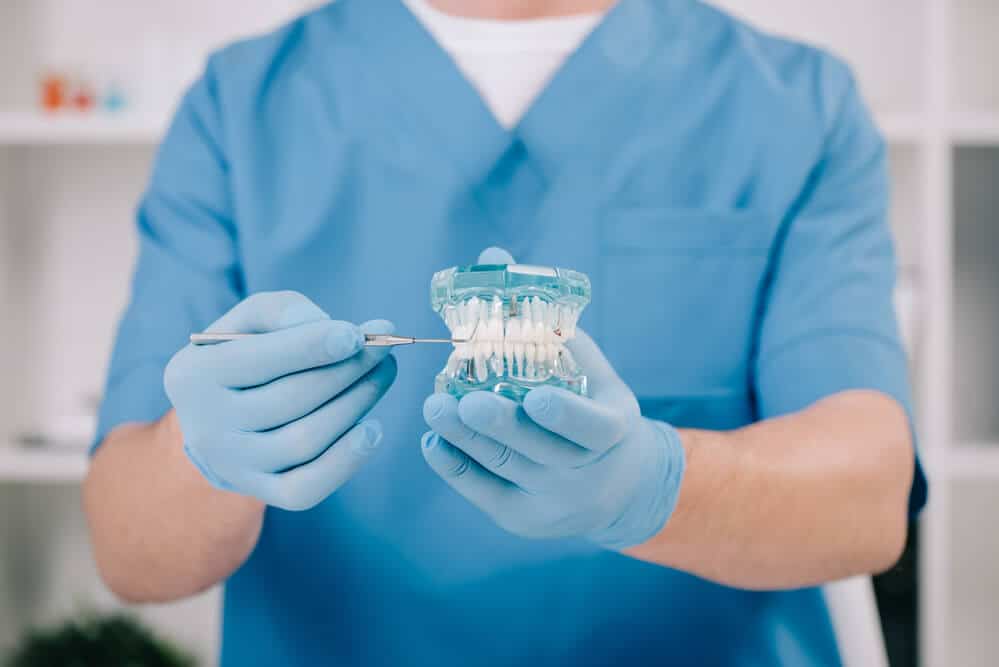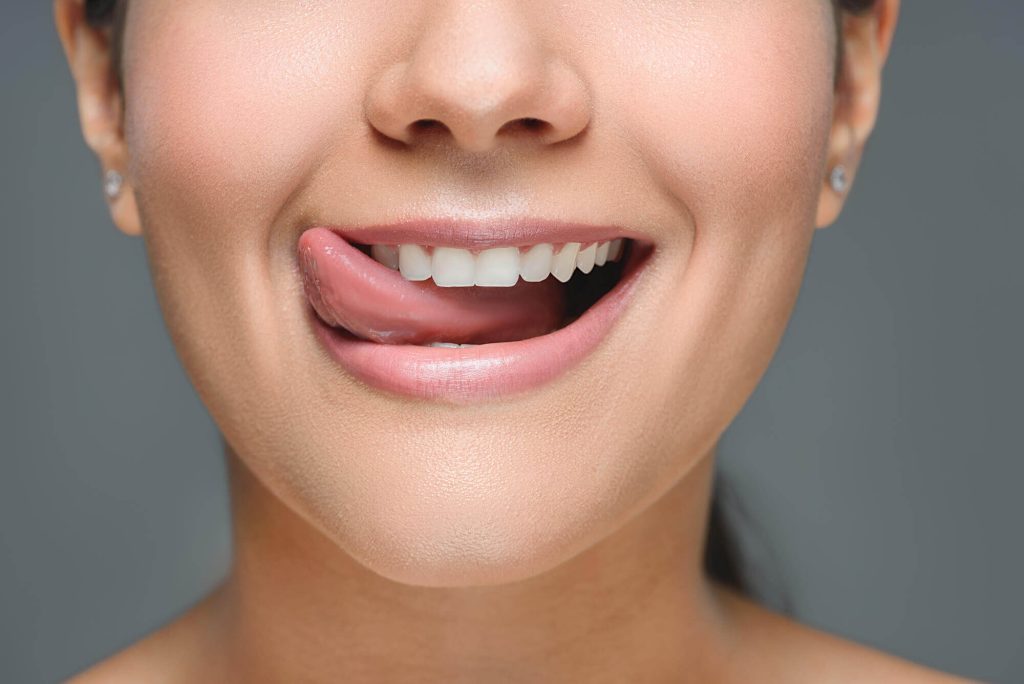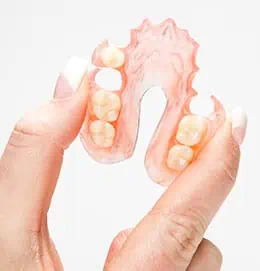Getting new dentures is exciting and bound to improve your life in multiple ways. But, as great as it is to chew and smile, the initial few days can be pretty difficult to navigate (and even a little awkward) while your mouth gets used to them.
You will likely start producing more saliva and may possibly develop painful spots in your mouth. But what else can you expect when you get dentures?
This article will answer the following questions, so you know exactly what to expect with your new dentures:
- Are new dentures sore?
- Is it difficult to chew food wearing new dentures?
- What foods can you eat?
- Is it difficult to talk with new dentures?
Knowing what to expect can help you feel more confident with your new dentures and practice proper denture care, as well as care for your oral health in general.
That's why we've written this beginner's guide to help you understand what dentures are, what they cost, what to expect, and some tips to make the adjustment process easier.
In This Article
What are dentures?


Dentures refer to the artificial replacement for missing natural teeth. They can either be partial, like flipper teeth, or full, depending on whether they replace all the teeth or just a few of them. You will also have the option of removable dentures vs. implant-supported dentures.
We have an entire article about these differences, but for a summary, check out the table below:
Implant-supported dentures | Removable dentures | |
Quality | Best for dentures | Old technology—the last resort |
Cost | More expensive than removable dentures | Old technology—the last resort |
Oral health | Preserves bone quantity and quality | Decreases bone quantity and quality |
Feel | Works and feels like your own natural teeth | Doesn't feel and function like your own natural teeth |
Stability | Strong an stable - no slippage | Can be unstable and unreliable |
Adhesives | No need for denture creams or adhesives | Denture adhesives and creams often needed |
Facial structure | Provides firm support of facial structures (lips and cheeks) | Support of facial structures decreases over time |
Regardless of the type of denture you choose, whether it's flexible partial dentures or implant dentures, experts in restorative dentistry will design your dentures specifically to fit your mouth, both in size and appearance.
What do new dentures cost?
The price of new dentures can vary between dentists and from practice to practice, and will also depend on which type of denture you get. Another factor that will make a big difference is whether you get your dentures through the NHS or privately.
If you get your dentures with the NHS, you will have limited choices but the price will only be a band three treatment charge, which is £282.80 as of March 2022. This cost will slightly vary depending on which UK country you are in, but not by too much.
Private prices are much higher and the price of new dentures can range from £200 to £2,500 depending on the type and quality you choose.
The following table summarises new dentures cost depending on what you choose and whether you opt for NHS care or private care:
Type of denture | Traditional (NHS) | Traditional (private) | Implant-supported | Flexible |
Material | Acrylic, nylon or metal, rigid shape | Acrylic, nylon or metal, rigid shape | Titanium dental implant with overdenture | Nylon-based resin, soft and flexible |
Full or partial? | Either | Either | Full | Partial only |
Cost | £282.80 | £250 - £2,500 depending on the material, quality and number of teeth | £4,000 - £14,000 for a full jaw depending on the system used | £450 - £1,500 depending on the number of teeth |
Why wear dentures?
Losing your natural teeth can negatively affect your oral health and have some unwanted side effects. Not only can it cause aesthetic problems, but it also decreases the bone support needed to keep the structure of the mouth intact.
Wearing dentures can help:
- Improve your speech
- Keep your cheeks from sagging inwards
- Improve your ability to chew and bite food
- Protect the remaining natural teeth from damage


New dentures: What to expect
As you wear your new false teeth, you may experience a few temporary side effects. These side effects are common and will pass.
Let's go over some things you may experience with new dentures.
Sore spots
Often, your dentist will schedule a follow-up visit around 48 hours after your initial denture fitting. You may have already developed some sore spots in your mouth from contact with the dentures. This soreness occurs as the dentures settle onto the soft tissues of the mouth.
In rare instances, there are other reasons for these sore spots, so let your dentist know in order for them to make an accurate evaluation.
Minor discomfort
It is absolutely normal to experience minor discomfort as you get used to your new set of dentures. How long this lasts will vary from person to person. If you're getting dentures after teeth extractions, the extraction site may also feel extra sensitive for a few days.
Many people develop temporary soreness after getting dentures. Visiting your dentist for readjustment can help alleviate this discomfort to some extent. You may also consider removing your dentures every four hours while your jaw and gums get used to them.
Increased saliva
During the initial few weeks after getting dentures, your mouth will automatically start producing more saliva. However, this is only temporary and will go away.
Talking with new dentures
Don't be surprised if you cannot speak properly after getting dentures. You might find that it's difficult to pronounce certain words, especially ones with “f” and “s” sounds. This is temporary, but it may take a little practice and time to get back to normal speech.
Note that if your denture makes a clicking sound while you speak, it may be because the frame is not perfectly in place. Talk to your dentist because your dentures may require some fine-tuning for a better fit or even a denture reline.
Meanwhile, consider speaking slowly. It may feel like your new teeth are slipping away as you talk, cough, or laugh. This is common and is not something to be worried about—though it feels a little disconcerting. All you need to do is bite down gently followed by swallowing to restore the denture to its proper position.
Can I eat with new dentures?
It's probably something every single person with new dentures has thought about. The answer is yes, you can definitely eat with dentures in your mouth, but there are certain things to be aware of.
Adjusting to dentures includes making certain modifications to your eating habits. This is because dentures may make it difficult to bite and chew food. The first rule of thumb after getting new dentures is to be careful. Begin by eating soft foods that do not require too much chewing.
Eating foods like red meat, nuts, or anything crunchy is going to put stress on your denture and the gums beneath it, increasing the risk of inflammation and irritation.
Is chewing with dentures difficult for you?
If you are finding eating difficult, here are some tips for chewing with new dentures:
- Eating with dentures for the first time is definitely hard. So start with a soft diet with denture-friendly foods like applesauce, cooked cereals, mashed potatoes, and scrambled eggs. These soft foods will help provide your body with the nutrients it needs without disturbing your oral health.
- Avoid hot foods that may burn your mouth. Having newly-fitted teeth can temporarily affect your ability to judge temperatures because of the insulating effect.
- Avoid holding any liquids in your mouth, as this can loosen the dentures.
- Avoid eating spicy foods because they can irritate the sores in your mouth that are caused by your dentures.
Once you get used to wearing dentures daily, you will return to your normal diet for the most part. For some people, there are certain foods that still provide some challenges, mostly because of their hard, sticky texture. Some examples of food that you should consume with extreme care include:
- Crunchy fruits
- Raw vegetables
- Crusty bread
- Stringy meats
- Popcorn
- Crackers
- Chewing gum
- Whole nuts
According to this study, denture wearing adults in the UK have a lower daily intake of nutrients compared to those without. However, losing teeth shouldn't mean that you should sacrifice your general health.
So, as you are struggling to get used to your new dentures, do not stop eating nutritious foods just because you find them a bit harder to eat. All you need to do is take it slow. Start with a soft diet and gradually move up to harder foods.
In the video below, Dr Chhaya Chauhan discusses how to eat with your new dentures.
Follow your post-extraction plan
One of the most important steps you can take when getting used to your new tooth denture is to make sure you are following your treatment plan. Everyone heals differently, but most people will experience mouth soreness following an extraction.
The exact amount of time needed for you to be comfortable with your dentures also depends on the type of dentures you are using. Your gum line tends to shift over time, so dentures may need to be adjusted eventually.
Take any medications prescribed by your dentist, and follow their post-extraction guidelines exactly, which will help reduce your discomfort. It's also very important that if you get same-day temporary dentures, make sure that you go back to your dentist to get your regular dentures when they're ready.
Lastly, don't skip any dental check-ups during the initial few months of getting dentures. Even if you're finally comfortable with dentures, don't forget to take care of your oral health and keep up with your regular check-ups.


Conclusion
Dentures can be a little hard to get used to in the beginning. But have patience and you'll feel comfortable with them soon.
Just remember to take good care of them and keep them in good shape. With just a little practice, you will talk, laugh, eat, and smile with all the confidence in the world.
FAQs
How long does it take until you can eat solid food after getting dentures?
It takes almost three to four weeks before you can eat solid foods again. When you do, cut them into bite-size pieces to make the whole process a lot more comfortable.
How long does it take to get used to new dentures?
On average, it takes about 30 days to get used to dentures. Be patient during this time, as it can be difficult for you to speak and eat. Practice speaking, and start off with soft foods.
Why are my new dentures loose?
After losing teeth, your gums no longer need to hold your teeth in place, so they shrink. This process is called bone resorption and causes your dentures to become a little looser.
NHS: Dentures (false teeth). Consulted 17th March 2022.
International Journal of Behavioral Nutrition and Physical Activity: The impact of dental status on perceived ability to eat certain foods and nutrient intakes in older adults: cross-sectional analysis of the UK National Diet and Nutrition Survey 2008–2014. Consulted 17th March 2022.




